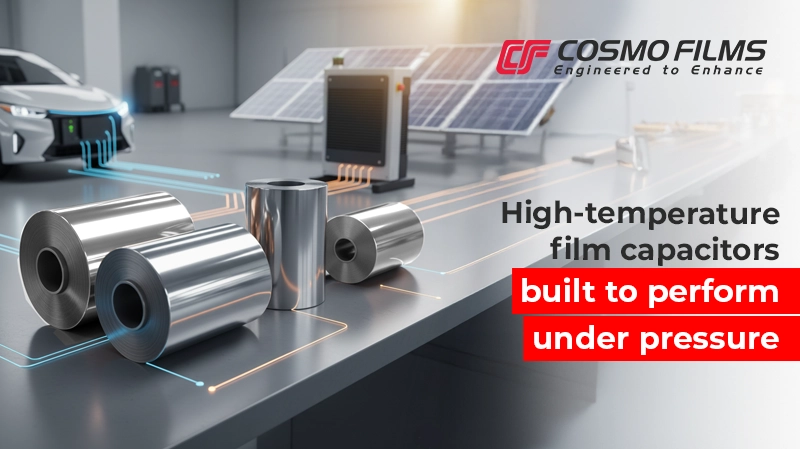Love to hear from you!
Get in touch.

In today's world, electronics are everywhere - from
cars and aeroplanes to solar inverters and factory equipment. But what happens
when this equipment are pushed to its limits in hot environments? Many
electronic parts slow down, wear out, or even fail. One small but mighty
component that often faces this heat challenge is the capacitor
polypropylene films.
Our film capacitors are built to handle extreme
temperatures, and they're changing what engineers can design and where
electronics can operate. Let's explore what makes these capacitor films special
and why they're a smart choice for demanding applications.
Inside a capacitor, there is a thin layer of film
coated with metal that acts like the plates of a mini battery, but instead of
storing power for long periods, it helps circuits run smoothly and reliably.
In most everyday devices, capacitors don't get very
hot. But in industrial equipment, electric vehicles, or high-power systems,
temperatures rise fast, and that's when regular capacitor films start to
struggle.
The problem - heat the silent killer
When electronics get hot, things start to go wrong.
High heat causes:
It might sound hot, but in real-world conditions - like
under a car hood, in a solar inverter under direct sunlight, or inside an
industrial motor drive, temperatures can easily go higher. That's where high-temperature polypropylene capacitor films come in.
Our film capacitors are designed to perform reliably
even in high temperatures. Here's what gives them the edge:
·
These films don't melt or warp easily and
maintain their performance even when the temperature rises.
·
If a tiny part of the metal layer inside gets
damaged by a voltage spike, the capacitor films heal itself. This keeps
the rest of the films working, a clever feature that adds to its long life and
reliability.
·
High-temperature film capacitors are designed
with better internal layouts and cases that help spread and release heat
evenly.
·
From aerospace to renewable energy, these film capacitors
can handle vibration, high current, and rapid temperature changes without
losing their performance.
One great example of a film capacitor that truly takes
the heat is the COSMO SUPER Capacitor Grade Films. Our films remain cool under
pressure, which is perfect for systems where failure is not an option.
Some of the applications include:
Switching to a capacitor polypropylene film
means fewer failures, lower maintenance costs, and better overall performance.
Why choose a high-temperature film capacitor?
Here's what you get when you choose a capacitor film
designed for heat:
·
Longer life - Less downtime and fewer
replacements.
·
Stable performance - Consistent output,
even in hot conditions.
·
Energy efficiency- Lower heat losses and
reduced self-heating.
·
Smaller cooling needs - Less need for
fans or thermal management.
·
Better safety margin- Lower risk of
breakdown or circuit failure.
Heat is one of the biggest enemies of electronics, but
it doesn't have to be anymore. With right capacitor films like ours,
your system can run cooler, last longer, and perform better under the most
demanding conditions.
Cosmo film capacitors are proof that smart engineering
can beat the heat. They deliver reliability, stability, and peace of mind,
exactly what today's advanced systems need.
Featured Post
Love to hear from you!
Get in touch.